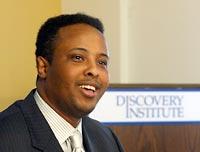Seattleite May Serve As Somali Diplomat

Koshin Mohamed, 28, who came to Seattle 10 years ago, says Somalia’s transitional government has asked him to be its envoy to the U.S.
Koshin Mohamed, a 28-year-old Somali refugee who came to Seattle 10 years ago, says he’s been asked by the transitional government of Somalia to be its ambassador to the U.S. if and when that government is recognized by the United States.
At a news conference Wednesday sponsored by the Discovery Institute, a conservative Seattle-based think tank, Mohamed said he doesn’t know when that recognition might come though, for the sake of his country and its people, he hopes it is soon.
Somalia, on the Horn of Africa, has been without central leadership since the collapse of its government and outbreak of civil war in 1991. It has no embassy in the U.S. and thus no immediate role for an ambassador.
A State Department spokesman said that while the U.S. supports the transitional government, it has no diplomatic relationship with it. Mohamed said his credentials have not yet been submitted to the department.
Bruce Chapman, president of the Discovery Institute, said the institute has been supportive of Mohamed since he spoke there in November, and has helped with his lobbying efforts in Washington, D.C.
Perhaps best known for promoting the concept of intelligent design, the Discovery Institute also focuses on transportation issues and foreign policy.
Mohamed, who owns a financial-services firm called Asli Financial Services, said he is a naturalized U.S. citizen and has been representing the Somali transitional government before U.S. officials in Washington, D.C.
That government, formed by the United Nations two years ago, came out of hiding last week with help from Ethiopian troops to assume control of the war-ravaged country. Using their military might, the Ethiopians expelled from power a movement of Islamists and their fighters who began ruling under strict Islamic law in June.
The movement had been inviting extremists into Somalia, Mohamed said, pointing out that one of its leaders is on a U.S. government terrorist-watch list.
advertising
Mohamed said he likes the politics of Abdullah Yusuf, president of Somalia’s transitional government and a member of his clan. “And it’s not because he’s my uncle [referring to clan relationship, not blood]. He’s credible.”
“The work has just started,” Mohamed said, adding that the U.N. has estimated it will take about $15 billion to stabilize the country. “We need the U.S. government to help us establish leadership in the country.”
Although he headed a Somali community group in Seattle, Mohamed doesn’t appear to be well-known among local Somalis. Some who are familiar with him called him ambitious but declined to comment on the record.
Jama Musse, who heads the East African Community Development Council, did say, “I think he will be good as ambassador. From what I understand, he’s been working with the government.”
Mohamed said at the news conference that he graduated in 2003 from the University of Washington, where he studied American ethnic studies. But university records indicate he has not graduated and that there are several financial holds on his record.
Asked about that discrepancy, Mohamed said he is only a few classes short of graduating and expects to clear his record.
The Discovery Institute’s Chapman said Mohamed has won the support of many current and former members of Congress, including former Washington Sen. Slade Gorton.
Gorton, an attorney with the Seattle law firm of K&L Gates (formerly Preston Gates & Ellis) and a member of the Discovery Institute board, said he met Mohamed several years ago and that his firm has helped Mohamed secure the diplomatic credentials needed to move within government circles in Washington.
“We supported him even before the transitional government was established.”